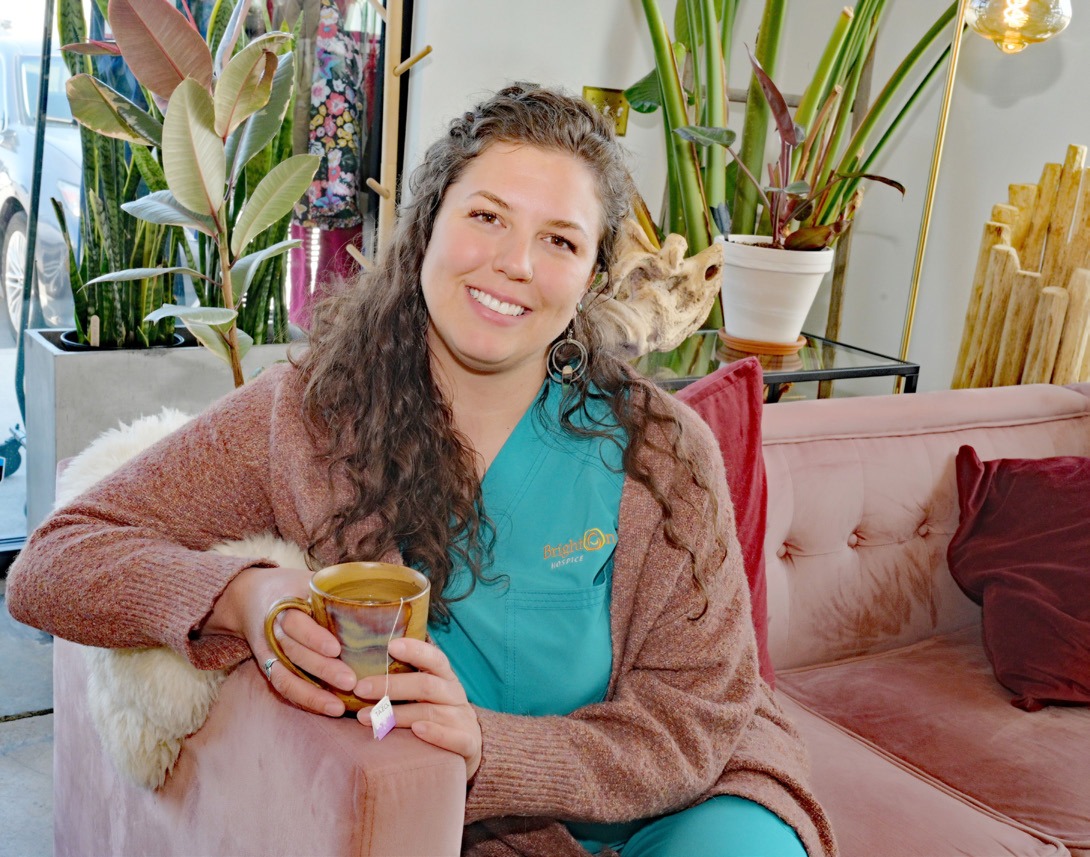If I surveyed 50 people, and asked each of them to define the job of a registered nurse, odds are good most of those surveyed would draw a parallel between nursing and saving lives. In fact, as part of my research for this week’s column, I collected an entire page of inspirational quotes about the nursing profession. Each quote I came across shared the same sentiment of celebrating nurses and life together. One quote by an unnamed author read, “Save one life, you’re a hero. Save a hundred lives, you’re a nurse.”
I wondered, though, what about the nurses who are called to a different purpose – not specifically to save lives, but to celebrate lives well-lived, and to facilitate peaceful transitions into death. These nurses are heroes, too. These nurses work in hospice.
Renee Boswell took an unconventional path to nursing. She didn’t start nursing school until she was well into her thirties. After receiving her RN certification, Boswell spent her first five years as a nurse in the Medical Cardiac Unit at St. Francis Hospital on Woodmen Road.
“When I was a student, I spent clinical hours on the cardiac floor. They had a really good culture,” she shares. “When I worked on the cardiac floor, we were a family. We got through COVID together! If one nurse had a difficult patient, other nurses would rally to help. I think those early years of my career molded me into the nurse I am today.”
Today, Boswell is a nurse for Brighton Hospice. This organization provides end-of-life care in private homes and assisted living facilities. Boswell is forthcoming about the heavy hit hospital-nursing took after the COVID pandemic.
“I saw a lot of people die,” she says.
The trauma of being a medical provider during the pandemic had a widespread impact on those on the front lines.
“We lost so many healthcare workers after COVID. People were freaked out. Nurses were exhausted,” Boswell says.
I ask Boswell why she chose to stay in nursing.
“I’m meant to be a healer,” she begins, but humbly backpedals, saying “no, not a healer,” before deciding there is no other way to put it: “Yes. I’m meant to be a healer.”
After a long pause, she settles on these words, “It isn’t in my heart to walk away from nursing.”
Boswell is not immune to seeing people die. She says witnessing so many patients die during the pandemic gave her a unique perspective on hospice care. Care, in Boswell’s current line of work, often includes what she describes as “the challenging and emotional task of helping people manage the big feelings around death.”
Sometimes, Boswell helps train registered nurses who are new to hospice.
“I don’t want people to think hospice means you have no more hope,” she emphasizes. “If our team of nurses, spiritual counselors, social workers and home health aides gets to families early enough in their loved one’s terminal diagnosis, hospice care actually provides a greater quality of life in the end.”
The transition out of this world can be really beautiful. – Renee Boswell, hospice nurse.
Boswell is driven by this reality: that humans have just one experience of dying. It’s her job to make this passage as peaceful as possible.
Working as a hospice nurse involves communicating the death experience to both patients and their loved ones. “The transition out of this world can be really beautiful,” she shares.
She finds beauty in observing patients who seem to have some final control in their passing.
While Boswell says she has never subscribed to a formal religion, she reveals, “there are beautiful things that happen in death with no explanation.”

“Some of my patients wait to let go until their room is empty. Maybe family members have been sitting in the room all day, and then the last person leaves to go to the bathroom, and that is when the patient dies. I’m comfortable with letting that be a mystery,” she finishes, gently.
A time in her career that stands out is when she helped a son say goodbye to his dad.
“There are plenty of families with relationships that were not perfect,” she relates. “I remember helping to ease a dying father into death. He and his daughter had worked through negative feelings. She hadn’t loved growing up with him, but the two were able to move on with a relationship. So, that was good.”
But emotions between the son and his father were unhealed. When Boswell was in their house, she could sense the dad wasn’t ready to die – that he was waiting for something. In her evolving role, Boswell became a mediator. She helped the son find “one sentence” of gratitude, and he shared it with his dad.
Boswell confides, “It doesn’t always take a lot. Just a few words can bring a patient peace.”
Boswell defines her experience of working in hospice as an exuberance of love. “When a family tells me I have been a comfort to them,” she whispers, “it is the most rewarding job I could ever have.”
A difficult part of hospice nursing, though, is “being realistic without being hopeless. These patients have an underlying diagnosis we can’t get around.” Boswell explains. “So, when a patient has a ‘rally,’ (meaning a few good days with mental clarity or atypical strength) I gently remind family members just to appreciate the moments.”
Boswell believes in helping people manage their grief through her innate compassion. She smiles with great warmth; her brown eyes are deep and engaging. If there is a quote to summarize the type of registered nurse who eases patients from life into death, it might be this one, from Mahatma Gandhi, “The best way to find yourself, is to lose yourself in the service of others.”

